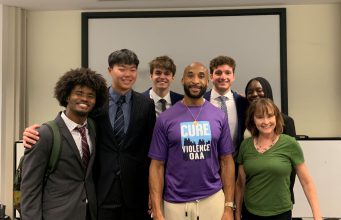 A team from Emory University’s Goizueta Business School in Atlanta won first place in the NextBillion 2011 Case Writing Competition, sponsored by NextBillion partners The William Davidson Institute at the University of Michigan, Acumen Fund and Ashoka. The winning team of Carol Gee, MBA student, and Peter Roberts, Associate Professor of Organization & Management, wrote “Village Capital: Using Peer Support to Accelerate Impact Investing.” The case covers the opportunities and challenges facing Village Capital, an impact investment program that generates both financial and social returns and uses crowd sourcing to support seed-stage social entrepreneurs.
A team from Emory University’s Goizueta Business School in Atlanta won first place in the NextBillion 2011 Case Writing Competition, sponsored by NextBillion partners The William Davidson Institute at the University of Michigan, Acumen Fund and Ashoka. The winning team of Carol Gee, MBA student, and Peter Roberts, Associate Professor of Organization & Management, wrote “Village Capital: Using Peer Support to Accelerate Impact Investing.” The case covers the opportunities and challenges facing Village Capital, an impact investment program that generates both financial and social returns and uses crowd sourcing to support seed-stage social entrepreneurs.
The NextBillion 2011 Case Writing Competition, currently in its second year, recognizes and publishes the best new business cases on Social Enterprise or Base of the Pyramid (BoP) topics. The goal of the annual competition is to engage students and faculty on campuses globally in the emerging field of Social Enterprise. All of this year’s case submissions were required to describe organizations that have both a specific social objective and seek long-term self-financing. Judges included Robert Kennedy and Ted London of The William Davidson Institute, Moses Lee of the Social Entrepreneurship Initiative at the University of Michigan, Stephanie Schmidt of Ashoka, international development consultant Zenia Tata, and Brian Trelstad of Acumen Fund.
The Emory team’s first place case and the other 2011 winners have been published by GlobaLens, the
publishing division of The William Davidson Institute, and can be found at http://globalens.com/casedetail.aspx?cid=1429180. GlobaLens features one of the largest collections of BoP and Social Enterprise teaching cases available from any publisher.
Other winning submissions came from Indiana University’s Kelley School of Business in Bloomington; University of Michigan Medical School, Ann Arbor; Ross School of Business at the University of Michigan, Ann Arbor; and Wake Forest University, Winston-Salem, NC.
The Emory University team received $1,000 for first place. The second place winner was awarded $500, third place $250, and fourth and fifth place each received $100. All winners also received autographed copies of The Blue Sweater by Acumen Fund founder Jacqueline Novogratz.
About NextBillion
NextBillion is the premier blog and online resource on market-based approaches to poverty alleviation. NextBillion acts as a discussion forum and knowledge base for business leaders, social entrepreneurs, NGOs, policy makers, and academics interested in business strategies that improve the lives of those at the Base of the Pyramid – the world’s approximately four billion low-income producers and consumers.
About The William Davidson Institute
Founded in 1992, the William Davidson Institute (WDI) at the University of Michigan develops and disseminates research and expertise on business in emerging-market economies. With current and past research initiatives (such as Base of the Pyramid, environmental sustainability, Green Leap, and social venture partnerships), development consulting services, educational outreach, and field-based collaborations, WDI creates long-term value for academic institutions, partner organizations, and donor agencies active in emerging markets.
About GlobaLens
GlobaLens, a division of The William Davidson Institute at the University of Michigan, publishes and distributes relevant, cutting-edge business cases and other teaching materials for top-tier business schools worldwide. The current catalog of over 350 case studies, simulations, conceptual notes and exercises is available via GlobaLens.com and features materials suitable for MBA or undergraduate business students.
About Acumen Fund
Acumen Fund is a non-profit global venture fund that uses entrepreneurial approaches to solve the problems of global poverty. Its aim is to help build financially sustainable and scalable organizations that deliver affordable critical goods and services that improve the lives of the poor.
About Ashoka
Ashoka is the global association of the world’s leading social entrepreneurs—men and women with system changing solutions for the world’s most urgent social problems. Since 1981, Ashoka has elected over 2,500 leading social entrepreneurs as Ashoka Fellows, providing them with living stipends, professional support, and access to a global network of peers in 70 countries.










